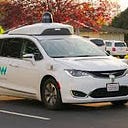Turning Driving Into An Office Job
Bloomberg has a short update on Phantom Auto, a teleoperations startup that has recently partnered with Mitsubishi Logisnext to remotely operate warehouse forklifts.
Phantom Auto was founded by some of the earliest students in the Udacity Self-Driving Car Engineer Nanodegree Program that I led, so I’m excited to see them doing well.
Co-founder Elliot Katz tells Bloomberg that remote operation has “the potential to knock 30% or more off forklift operation costs.” The driver of cost-savings seems to the ability to move jobs to lower-cost areas, since the remote operator doesn’t have to be physically co-located with the equipment.
I imagine that what I’ve heard in agriculture also applies somewhat to logistics, which is that the big advantage of automation (to the extent remote operation counts as automation) is actually increased performance, rather than labor costs. In a field, an automated machine can plant seeds more accurately and squeeze more yield out of the same amount of land, compared to a farm hand. In a warehouse, you could imagine that removing humans from the floor could allow for reconfigurations that would save space, accelerate movement, or otherwise improve efficiency.
I’m also curious how far we can push the migration of in-person jobs into remote operation, and possibly eventual autonomy. Covid-19 has pushed diagnostic telemedicine pretty far in the US, but procedures still require the provider to be physically present. Perhaps in the future, my surgeon or dentist will be operating on me remotely, from another timezone.
Originally published at http://davidsilver.blog on May 13, 2021.

